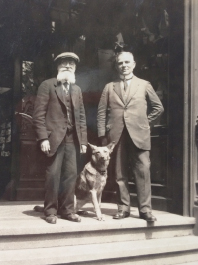Search for Names, Places and Biographies
Already layed Stumbling Stones
Suche
Marcus Max Blumenthal * 1873
Goldbekufer 42 (Hamburg-Nord, Winterhude)
1942 Theresienstadt
1944 Auschwitz ermordet
further stumbling stones in Goldbekufer 42:
Flora Blumenthal, Richard Katz, Gella Alice Katz
Flora Sara Blumenthal, née Lewy, born on 25 Jan. 1884 in Altona, deported on 19 July 1942 to Theresienstadt, deported further on 15 May 1944 to Auschwitz
Marcus Max Blumenthal, born on 18 July 1873 in Kabel/Westphalia, deported on 19 July 1942 to Theresienstadt, deported further on 15 May 1944 to Auschwitz
Max Blumenthal was born in Kabel (Ruhr) the son of Samuel Blumenthal and his wife Lisette, née Strauss. His wife Flora, eleven years his junior, was born in Altona. We can assume that the couple lived in the Ruhr for a number of years before arriving in Hamburg, for Flora Blumenthal paid membership dues in Hagen (Westphalia) before joining the Hamburg Jewish Religious Community in 1936. As the Hamburg phone directory indicates, they lived on the second floor at "Goldbeckufer” 42 in Winterhude from 1938 to 1941.
Flora Blumenthal’s younger sister Emilie, born on 1 May 1888, was married to the authorized signatory Walter Blumenthal, born on 5 Nov. 1885 in Herdecke near Hagen. Probably this was an instance of two brothers marrying two sisters. Prior to their emigration to Great Britain, Emilie and Walter Blumenthal as well as their daughters Elisabeth and Marianne Jakobine lived at Lenhartzstraße 9 in Eppendorf.
The sisters Flora and Emilie had co-inherited the apartment house at Langenkamp 7a, today’s Poelchaukamp, which accommodated 14 tenants.
The Blumenthal family was not spared the extensive financial plundering of Jews by the Nazis either: When after her emigration on Aug. 1938 Emilie Blumenthal entrusted her brother-in-law Max with the property management, the Chief Finance Administration (Oberfinanzdirektion) withdrew its permission within a few months. In the meantime, however, Max Blumenthal had sold his sister-in-law’s share, of which he informed the Office of the Chief Finance Administrator (Oberfinanzpräsidium) on 3 Jan. 1939. Promptly, the agency demanded to know "the authorization based on which the property … was sold.” Max Blumenthal had concluded the sale two weeks after the November Pogrom of 1938. Assisted by lawyers, he now managed over the course of a complicated series of application procedures to secure at least the proceeds of the sales for his sister-in-law in an "emigrant’s blocked account.”
In May 1939, Flora Blumenthal applied for permission to sell her share of the house, which was granted at the end of July. The purchase price had to be deposited in a blocked account as well; however, she was informed that she was free to dispose of the funds. The Customs Investigation Office had written to the Office of the Chief Finance Administrator (Oberfinanzpräsidium) regarding this matter on 27 May 1939 that the agency refrained from issuing as "security order” ("Sicherungsanordnung”), "since further assets did not exist.”
Only few clues exist about the living conditions over the following years. Evidently, the couple had to move to a "Jews’ house” ("Judenhaus”) in Altona, located at Sonninstraße 12, until receiving the deportation order, something noted on Max Blumenthal’s Jewish Community membership card as "outmigration” ("Abwanderung”).
On 19 July 1942, the Blumenthals were two among 926 Hamburg Jews deported to the Theresienstadt Ghetto. On 15 May 1944, they were transported from there to the Auschwitz extermination camp, where all traces of them disappear. One can assume that the Blumenthal couple was murdered immediately upon arrival.
The relatives emigrated to Britain probably survived. Unfortunately, the restitution files that we know existed as late as 1960 could not be found anymore.
Translator: Erwin Fink
Kindly supported by the Hermann Reemtsma Stiftung, Hamburg.
© Christine Meier, Ulrike Sparr
Quellen: 1; 2; 5; 8; StaHH 314-15 Oberfinanzpräsident, F 174; Festschrift "750 Jahre Boele", Hagen 2002; schriftliche Mitteilungen von Frau Jane Barry, 10.12.2015.
Zur Nummerierung häufig genutzter Quellen siehe Link "Recherche und Quellen".


